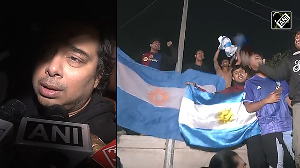The annual economic editors' conference in Delhi remains like the corner of the wall in the house where as a kid you marked your height with a pencil every year to see how much you had grown.
Now that I am a provincial scribe again (Bangalore is a good two and a half hours from Delhi as the plane flies), attending the conference gives a good measure of the changes in how the country runs and how that gets reported.
I began attending the conference from Kolkata in the early 1980s, and during tea, after a particular session, Vijay Kelkar gave me a back of the envelope calculation of how the nation and its reserves were gaining as crude output from Bombay High rose. It made a good exclusive and also defined how journalism mostly worked then -- someone gave you something, which you used and felt good.
How times have changed. Today, the most aggressive papers post hardnosed reporters to get a sentence or two out of ministers on the controversy of the day. What the Volker report had to do with the state of the economy is not clear but the conference gave a chance to pin down elusive ministers on it.
Another big change to me was how the finance ministry works. In the old days, the finance minister came to the conference with a galaxy of officers who fielded some of the more specific questions (usually by Swaminathan Aiyar or Prem Jha) with very useful statistics.
Even more important was the second session of the first day addressed by officials, as this was the real source of key statistics. Those days there was no monthly release of revenue and expenditure figures so one year all eyes were on N K Singh.
He knew he was the prima dona, delivered his line containing what today would be totally inadequate information, and thereafter walked out, turning the rest of the session into an anticlimax.
Today, under P Chidambaram, officialdom has receded into the background. He personally fields all the questions, the chief economic adviser leaving a little before time making no difference and, most important, the second session is not there.
Journalist from the provinces in the old days were very concerned about PSUs in their territories. Today, the concern has shifted to sick and closed units. All this is grist to the mill of populist politicians like Ram Vilas Paswan.
Prompted by questions, he went on and on about the revival of Indian Drugs and Pharmaceuticals Ltd. The villain standing in the way seemed to be schedule M compliance, without which the plant could not start. Why ensuring good manufacturing practices (that's what schedule M stands for), particularly when medicines are concerned, should be considered such a nuisance, was not clear.
My own question about whether we are adequately prepared to meet an attack of bird flue, should it hit, evoked an inadequate and almost ludicrous response from one of the officials. The minister, of course, did not intervene.
The one person who came out with shining colours was Montek Singh Ahluwalia. Governments come and go but he seems to go on forever, and seems to get better and better.
Even as his sense of humour gets more mellowed, he seems to be losing his earlier reticence in calling a spade a spade. He freely identifies lack of power sector reforms as enemy number one of sustained 8 per cent growth.
And he squarely turns the guns of the audience by saying that "economic editors" should place less emphasis on "the scam of the day" and focus on issues like power thefts. But unfortunately "there is no news here".





